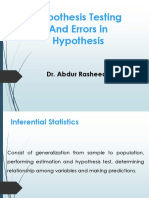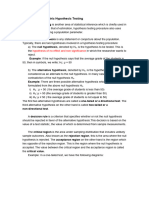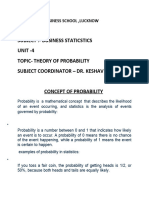ConditionalProbabilities Worksheet
Uploaded by
Prabhakar SharmaConditionalProbabilities Worksheet
Uploaded by
Prabhakar SharmaConditional Probabilities
Probabilities we assign to events often depend on prior knowledge about the occurrence or nonoccurrence of one or more other events. The probability that we assign to an event A when we have
prior knowledge that another event B has already occurred is called the conditional probability of A
given B. The conditional probability of A given B is denoted by: P(A|B)
The Monty Hall Problem (the three door probability problem)
http://en.wikipedia.org/wiki/Monty_Hall_problem
Suppose you're on a game show, and you're given the choice of three doors: Behind one door is a car;
behind the others, goats. You pick a door, say No. 1, and the host, who knows what's behind the doors,
opens another door, say No. 3, which has a goat. He then says to you, "Do you want to switch (pick door
No. 2) or stay with your first choice?"
Is it to your advantage to switch your choice?
Using Bayes' Formula:
Homework Exercise
The probability that a man between 50 & 70 will develop prostate cancer is approximately 8.54%.
A screening test for prostate cancer will detect the disease 80% of the time for men that have the
disease. For men that don't have the disease, the test is accurate 90% of the time.
(a) If a man gets screened for prostate cancer and receives a positive result, what is the probability
that he has the disease?
(b) If a man gets screened for prostate cancer and receives a negative result, what is the probability
that he does have the disease?
You might also like
- PeKa B40 Health Screening Manual For General Practioners - Final v2100% (1)PeKa B40 Health Screening Manual For General Practioners - Final v278 pages
- Gmail - FWD: Your IndiGo Boarding Pass & Itinerary - A7YPSINo ratings yetGmail - FWD: Your IndiGo Boarding Pass & Itinerary - A7YPSI5 pages
- IIF - Implementing Robust Risk Appetite Framework To Strengthen Financial Institutions - IIFNo ratings yetIIF - Implementing Robust Risk Appetite Framework To Strengthen Financial Institutions - IIF80 pages
- Hypothesis Testing and Errors in Hypothesis: Dr. Abdur RasheedNo ratings yetHypothesis Testing and Errors in Hypothesis: Dr. Abdur Rasheed29 pages
- A General Approach To The Monty Hall DilemmaNo ratings yetA General Approach To The Monty Hall Dilemma17 pages
- Computational Journalism 2016 Week 6: Drawing Conclusions From DataNo ratings yetComputational Journalism 2016 Week 6: Drawing Conclusions From Data75 pages
- M3-05a - Conditional Probability ExamplesNo ratings yetM3-05a - Conditional Probability Examples2 pages
- ST 371 (III) - Conditional Probability and IndependenceNo ratings yetST 371 (III) - Conditional Probability and Independence18 pages
- Probability and Probability DistributionsNo ratings yetProbability and Probability Distributions81 pages
- Buss. Stat - Chapter 3 Hypothesis TestingNo ratings yetBuss. Stat - Chapter 3 Hypothesis Testing10 pages
- Buss. Stat - Chapter 3 Hypothesis TestingNo ratings yetBuss. Stat - Chapter 3 Hypothesis Testing10 pages
- Frontiers of Computational Journalism - Columbia Journalism School Fall 2012 - Week 10: Drawing Conclusions From DataNo ratings yetFrontiers of Computational Journalism - Columbia Journalism School Fall 2012 - Week 10: Drawing Conclusions From Data51 pages
- Stat 110 Strategic Practice 3, Fall 2011No ratings yetStat 110 Strategic Practice 3, Fall 201123 pages
- Probability is a Numerical Measure of the Likelihood That a Specific Event Will OccurNo ratings yetProbability is a Numerical Measure of the Likelihood That a Specific Event Will Occur5 pages
- Probability: PSYB07 Gabriel Baylon October 2, 2013No ratings yetProbability: PSYB07 Gabriel Baylon October 2, 20139 pages
- Module 4 Parametric Vs Non Parametric TestNo ratings yetModule 4 Parametric Vs Non Parametric Test7 pages
- Unit IV Theory of Probability & Probability DistributionsNo ratings yetUnit IV Theory of Probability & Probability Distributions154 pages
- MATH-E5_Randomness-Uncertainty-and-ProbalityNo ratings yetMATH-E5_Randomness-Uncertainty-and-Probality88 pages
- Hypothesis Testing, Chi Square Test of Independence (1)No ratings yetHypothesis Testing, Chi Square Test of Independence (1)35 pages
- Mba ' Notes Theory of Probabilities in Business Statistics PDFNo ratings yetMba ' Notes Theory of Probabilities in Business Statistics PDF18 pages
- Three Approaches to Abortion: A Thoughtful and Compassionate Guide to Today's Most Controversial IssueFrom EverandThree Approaches to Abortion: A Thoughtful and Compassionate Guide to Today's Most Controversial Issue4/5 (8)
- Chapter - 2: Foreign Exchange Exposure and Risk Management100% (1)Chapter - 2: Foreign Exchange Exposure and Risk Management32 pages
- Test Hall Ticket 9020 02947 210221 0058: Tax Invoice (Duplicate) Tax Invoice (Original)No ratings yetTest Hall Ticket 9020 02947 210221 0058: Tax Invoice (Duplicate) Tax Invoice (Original)1 page
- ERM-Understanding Communicating Risk Appetite-WEB - FINAL - r9No ratings yetERM-Understanding Communicating Risk Appetite-WEB - FINAL - r932 pages
- Annex 2.10 Reporting of Derivatives Under Ibs: Country of The Counter Party: Is The CountryNo ratings yetAnnex 2.10 Reporting of Derivatives Under Ibs: Country of The Counter Party: Is The Country4 pages
- Monitoring Documentation: Checking The Work The Plan For Doing The WorkNo ratings yetMonitoring Documentation: Checking The Work The Plan For Doing The Work3 pages
- Mortgages - TCS Experience: Product Related Project RelatedNo ratings yetMortgages - TCS Experience: Product Related Project Related2 pages
- A Good Thesis Statement For A Cancer Research Paper100% (2)A Good Thesis Statement For A Cancer Research Paper6 pages
- Janae Presentation Template Pink VariantNo ratings yetJanae Presentation Template Pink Variant26 pages
- Singlife Shield Singlife Health Plus Product SummaryNo ratings yetSinglife Shield Singlife Health Plus Product Summary22 pages
- Denosumab: Claim Submission Cover Sheet For HCPCS Code J0897No ratings yetDenosumab: Claim Submission Cover Sheet For HCPCS Code J08972 pages
- Colon Cancer, Version 2.2021: NCCN Clinical Practice Guidelines in OncologyNo ratings yetColon Cancer, Version 2.2021: NCCN Clinical Practice Guidelines in Oncology31 pages
- All Rights Reserved.: Working Together To Grow Libraries in Developing CountriesNo ratings yetAll Rights Reserved.: Working Together To Grow Libraries in Developing Countries299 pages
- Reading - Passage - The Risks of Cigarette SmokeNo ratings yetReading - Passage - The Risks of Cigarette Smoke6 pages
- Oxford handbook of oncology Fourth Edition Bissett - Quickly access the ebook and start reading today100% (2)Oxford handbook of oncology Fourth Edition Bissett - Quickly access the ebook and start reading today41 pages












































































































